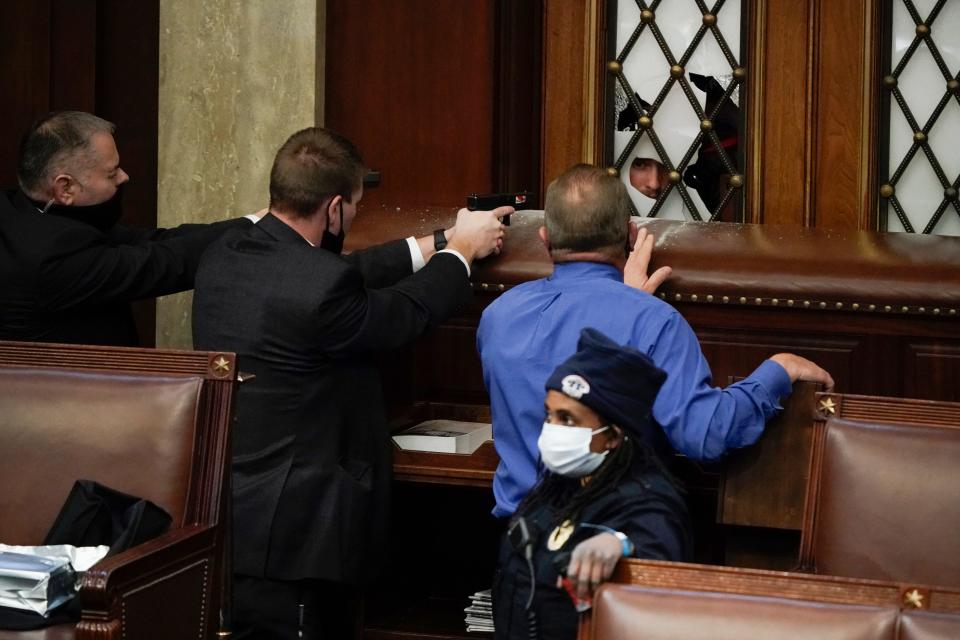Former U.S. Rep. Jim Kolbe, the last of Arizona's mavericks, leaves us with a challenge
- Oops!Something went wrong.Please try again later.
- Oops!Something went wrong.Please try again later.
- Oops!Something went wrong.Please try again later.

Like a lot of Americans, Jim Kolbe was mournful on Jan. 6, 2021.
The former GOP congressman – who bucked his party to support Joe Biden for president – was sad that Arizona tried overturning the results and even more distraught when rioters stormed his former workplace. That night, he saw a picture that really took his breath away.
With Kolbe’s passing last week, America lost a maverick. But he left behind a challenge for us to contemplate – hidden in plain sight in a famous photograph from Jan. 6.
Kolbe had a front-row seat to democracy
When James Thomas Kolbe moved from Chicago to Tucson in 1947, the 5-year-old learned that “trailblazer” wasn’t a nickname but a necessity. On the ranch, Kolbe found no clear paths. He literally had to make them.
Even the landscape seemed defiant. Cacti grew and ancient buttes with weathered faces rose above the desert floor, despite the threats of an unforgiving sun and wind and time.
After reading an article about “page” messengers in Congress, he carved another path to Washington, landing a page gig with “maverick” U.S. Sen. Barry Goldwater a few years later.
Another view:Arizona's last 4 congressional Republicans with guts and honor
He had a front-row seat to democracy. Pages sat at desks with a full view of the legislative chamber, and Kolbe developed a knack for helping people navigate the Capitol’s maze of underground tunnels. Years later in Vietnam, he likewise helped shipmates avoid enemy fire while maneuvering the narrow rivers of a foreign land, earning him the medal for valor.
He took his pathfinding ethos to Congress, winning election alongside close friend John McCain, who took over Barry Goldwater’s Senate seat and the maverick moniker.
He was stubbornly independent
Like McCain, Kolbe was a passionate conservative, but also stubbornly independent. He staked out positions on abortion, the environment and immigration that diverged with the party but aimed to bridge a wider divide.
His sexuality also made him an outlier. Kolbe was one of the first openly gay members of Congress and voted against the GOP’s gay marriage bans in the 2000s. He later married longtime partner Hector Alfonso.
If Ronald Reagan believed freedom was always “one generation away from extinction,” Jim Kolbe believed courage was the deciding factor. So he spent time at the wooden “page” desk on the House floor, mentoring the next generation.
Gunmen stormed the chamber in 1954, he told them, and pages bravely hauled wounded members to safety amidst the gunfire.
He was fixated on the metaphor – America being saved by the next generation – when he retired in 2007.
Data confirmed his worst fears of an increasingly divided nation. Since Jim Kolbe was elected in the 1970s, Pew surveys have shown Democrats are more liberal, Republicans are "much more conservative,” and mavericks are nearing extinction.
There’s only two dozen so-called moderates left on Capitol Hill, versus more than 160 in 1971-72.
A page desk divided chaos and democracy
When John McCain died in 2018, Donald Trump spurned celebrations of the Arizonan’s life. Kolbe had enough and left the party.
“Trump is the opposite of a conservative,” he declared in a blistering piece in the lead-up to the 2020 election. “He has no respect for American traditions or respect for its institutions.”
Kolbe recruited an alliance of Republicans to put country over party. After Biden won, Kolbe might have stepped away from politics for good.

But on Jan. 6, with democracy on the brink, he saw a picture that took his breath away. A half-dozen plainclothes cops crouched on the House floor behind a wooden desk blockading the doors to the chamber. They pointed guns at the intruders.
“It’s the page desk,” Kolbe told me. “The last line of defense was the page desk.”
He was right. The makeshift barricade that kept the insurrectionists out was the same table where young Capitol messengers – like him – first learned about democracy. They protected the hallowed legislative body once more, barely.
So Kolbe geared up for one more fight. “While no one in our movement desires a civil war in the GOP,” he wrote, “we are committed to planting a flag against the populist forces that have hijacked the modern Republican Party.”
Kolbe would've been pleased with our vote
Despite turning 80, the Arizonan threw himself into this year’s midterms to blaze a path back to sanity by defeating election deniers and MAGA candidates.
He was relieved by the outcome. Less than a month later, he passed away.
Jim Kolbe left behind a challenge. The standoff image from the Jan. 6 Capitol attack poses the question: If violent rioters return to democracy’s gates, will the next generation push back?
The ranks of people willing to put country over party seem to have thinned, nearly to the end. At least that’s how I felt when I got the news of Kolbe’s passing.
Then I saw the tributes. Democrats and Republicans came together on an issue that would have made the lawmaker blush: They agreed that Jim Kolbe was a once-in-a-generation mentor. He relished the title because he knew that if he did his job right, he wouldn’t be the last maverick.
This week Kolbe would’ve been pleased to know that his friends and acolytes in Arizona didn’t heed demands to overturn the midterm results. They certified them.
Miles Taylor is former chief of staff of the Department of Homeland Security, co-founder of The Forward Party and the author of "A Warning." Share your thoughts at press@forwardparty.com.
This article originally appeared on Arizona Republic: Jim Kolbe, the last of Arizona's mavericks, leaves us a challenge
